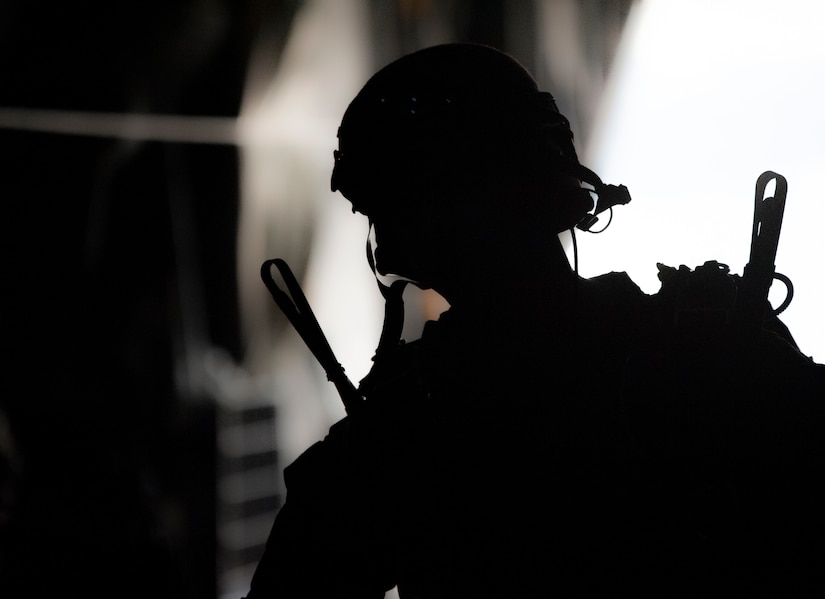By Terri Moon Cronk, DoD News, Defense Media Activity
WASHINGTON -- Candidates training to be special operators
evolve to the enemy that's developing by adapting and trying to overcome it,
two Air Force special-operator trainers said yesterday at the Pentagon in the
Defense Department’s “Showcasing Lethality” briefing series.
“From the battlefront and the training enterprise, from our
standpoint, we are the foundation of what builds our battlefront airmen, to
include our combat control operators, our pararescuemen, our [tactical air
control party] operators and our special operations,” said Air Force Master
Sgt. Robert Gutierrez Jr., superintendent of standards and evaluations for Air
Education and Training Command’s Battlefield Airmen Training Group, at Joint
Base-San Antonio-Lackland in Texas.
He and Air Force Master Sgt. Thomas J. Gunnell, a tactical
air control party craftsman assigned to the 26th Special Tactics Squadron at
Cannon Air Force Base in New Mexico, provide some of the most rigorous training
that goes into being a battlefield airman.
“We try to basically build individuals that would never
quit, [and] get them through arguably some of the hardest DoD training that's
out there,” Gutierrez said of the mostly junior-enlisted candidates, many of
whom are right out of high school.
While the two trainers said their attrition rate used to be
up toward 80 percent and 90 percent, it’s now closer to 69 percent. “It's still
pretty rough, and it's extensive and hard,” Gunnell said of the selection and
training processes.
Changes in Training
“How we have come to this point is honestly through
innovation and change,” he said, noting implementation of courses, such as an
eight-week pilot program called the Battlefront Airmen Preparatory Course,
which has added to changes in training.
“We are making individuals that come through from [basic
military training] fitter, faster, stronger and more mentally resilient,”
Gunnell said, “[while we] familiarize them with the training and the types of
environments we're going to put them in.”
Gutierrez emphasized how the jobs that result from the
intense training involve huge responsibilities.
“In some instances,” Gutierrez said, “they're E-4s [or] E-5s
controlling million-dollar aircraft, [and they] are responsible for lives and
making the right moral and ethical decisions on the battlefield.”
Yet, the trainers don't just build war fighters -- they
build responsible noncommissioned officers and train them to go out and “do the
fight,” Gutierrez said. “We're building the best candidates out there in the
world,” he added.
They agreed that today’s technology, which produced
equipment such as unmanned aircraft and sophisticated munitions has taken
training a long way in recent years.
Full-on Operators
Gunnell said trainers must turn candidates into “full-on
operators” for the operational force because they're essential in light of the
operations tempo made necessary by numerous global threats.
Training is now more science-based, with strength and
conditioning coaches, athletic trainers and even physical therapists, he noted.
“We have operations psychologists that are sitting there watching and assessing
these candidates to make sure we are taking the right individual that's going
to make the right decision when it's needed,” he said.
Emphasizing that safety is their No. 1 concern, the trainers
said they prepare candidates in all environments to meet the needs of building
a fitter, faster, stronger and mentally resilient airman to support any given
effort. Gunnell said today’s candidates are “amazing” in their physical and
mental abilities.
“We're not getting the same guys, probably, that [Gutierrez]
and I were when we first came in,” he said. “The [people] we're getting now are
stronger and smarter. Their aptitude levels are just unreal.
“It's awesome to see them grow from young airmen,” said he
continued. “We put them out on the battlefield … in Afghanistan and Iraq,
everywhere all over the world, and they just take it and come back with a
little experience. They get a little confidence, and then we're able to grow a
little bit further. I teach them so much based off what I've learned. But then
they come back with that experience. They teach the next crop of guys coming
in.”
Training special operations candidates is becoming more
lethal, Gunnell said, drawing on experience from war in Afghanistan and Iraq.
“We've been doing this for 17 years now, and it's helped us grow the nation's
young people and [produce] some incredible individuals.”









No comments:
Post a Comment